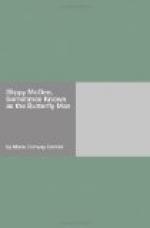“Why—I dare say I should,” said I, contritely. “But,” I added, after a pause, “I shouldn’t be any the better for it, should you think?”
“Not so you could notice,” shortly. And after a moment he added, in an altered voice: “Rule 1: Can the Squeal!”
I think he most honestly tried to. It was no easy task, and I have seen the sweat start upon his forehead and his face go pale, when in his eagerness he forgot for a moment the cruel fact that he could no longer move as lightly as of old—and the crippled body, betraying him, reminded him all too swiftly of his mistake.
The work saved him. For it is the heaven-sent sort of work, to those ordained for it, that fills one’s hours and leaves one eager for further tasks. It called for all his oldtime ingenuity. His tools, for instance—at times their limitations irked him, and he made others more satisfactory to himself; tools adjusted to an insect’s frail body, not to a time-lock. Before that summer ended he could handle even the frailest and tiniest specimen with such nice care that it was delightful to watch him at work. The time was to come when he could mend a torn wing or fix a broken antennas with such exquisite fidelity to detail that even the most expert eye might well be deceived.
I had only looked for a little temporary help, such as any intelligent amateur might be able to furnish. But I was not long unaware that this was more than a mere amateur. To quote himself, he had the goods, and I realized with a mounting heart that I had made a find, if I could only hold on to it. For the first time in years I could exchange specimens. My cabinets began to fill out—with such perfect insects, too! We added several rare ones, a circumstance to make any entomologist look upon the world through rosy spectacles. Why, even the scarce shy Cossus Centerensis came to our very doors, apparently to fill a space awaiting him. Perhaps he was a Buddhist insect undergoing reincarnation, and was anxious to acquire merit by self-immolation. Anyhow, we acquired him, and I hope he acquired merit.
We had scores of insects in the drying ovens. We had more and ever more in the breeding cages,—in our case simple home-made affairs of a keg or a box with a fine wire-netting over the food plant; or a lamp-chimney slipped over a potted plant with a bit of mosquito-netting tied over the top, for the smaller forms.
These cages were a never-failing source of delight and interest to the children, and at their hands heaven rained caterpillars upon us that season. Even my mother grew interested in the work, though Clelie never ceased to look upon it as a horrid madness peculiar to white people.




